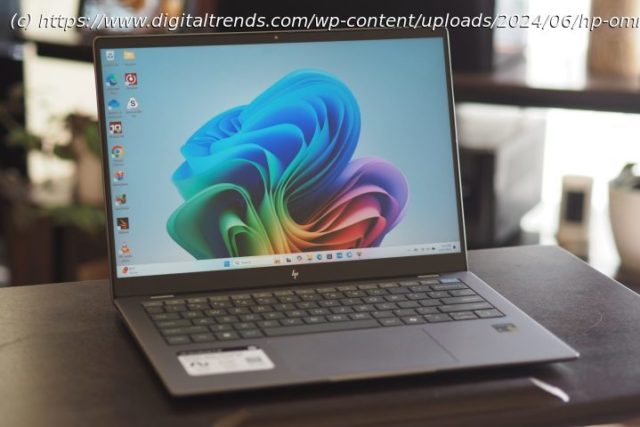The HP OmniBook X is one of the first laptops introduced in an upcoming crop of new Windows on Arm machines. It holds promise while raising some questions.
Windows laptops are undergoing perhaps the most significant transformation in their history, largely spurred by Apple’s successful transition from Intel chips to its Apple Silicon Arm architecture that’s afforded both fast performance and industry-leading efficiency.
Microsoft’s Copilot+ PC is named for new AI features, but it’s rolling out first on the new Qualcomm Snapdragon X Elite Arm chipset that promises to challenge Apple in both performance and battery life.
At the same time, HP has rebranded its laptops as the OmniBook, replacing the Pavilion, Envy, and Spectre brands. The OmniBook X is HP’s first Copilot+ laptop and its current Windows on Arm machine based on the Snapdragon X Elite. It’s safe to say that the OmniBook X is an entirely new kind of Windows laptop. It might not defeat the MacBook Air M3 outright, but it offers a compelling alternative to the current selection of Intel and AMD laptops available right now.Specs and configurations
The OmniBook X comes in just two configurations. For $1,150, you get the Qualcomm Snapdragon X Elite X1E78100 chipset, 16GB of RAM, a 512GB SSD, and a 14.0-inch 2.2K IPS display. For $100 more, you can upgrade to a 1TB SSD.
Those are attractive prices for a laptop with excellent performance and very good battery life. Its most direct competitors, the Apple MacBook Air M3 and Dell XPS 13, are considerably more expensive.Design
The big news here is the introduction of the latest Windows on Arm running on the Snapdragon X Elite, as well as the new Copilot+ AI features that, for now, run exclusively on Qualcomm’s chipset. I won’t be delving into AI, in part because the biggest feature — Recall — has been delayed. The rest of the features aren’t unique to the OmniBook X, and aren’t nearly as groundbreaking. But the features that are available today include enhanced Studio Effects, Live Captions, and Cocreator, and these features leverage the extra AI performance in the Snapdragon X Elite chipset.
Setting all of those concerns aside, we still need to evaluate the OmniBook X as a laptop. And in this regard, it’s a strong start to HP’s new branding.
To begin with, it’s well-built, with an aluminum chassis and lid that are mostly rigid — only the lid demonstrates a bit of flexing under moderate pressure. The Apple MacBook Air M3 suffers from the same thing while the Dell XPS 13 is more solid overall. These are all quality laptops, though. The OmniBook X is also reasonably thin and light, with the MacBook Air being by far the thinnest at just 0.44 inches and 2.7 pounds. The OmniBook X is 0.56 inches and 2.97 pounds and the XPS 13 is around the same thickness (0.58 inches) and is the lightest. Of course, the OmniBook X is the largest with its 14-inch display and thicker display bezels.
Aesthetically, the OmniBook X does’t break any new ground. It’s available in two colors, Meteor Silver and Ceramic White. I reviewed the former, and it’s attractive enough with smooth edges and a keyboard that’s a slightly darker color. The MacBook Air M3 has a more elegant simplicity while the XPS 13 stands out as more modern when you open the lid. But nobody will likely choose from among them based on looks alone.Keyboard and touchpad
The OmniBook X keyboard has the same comfortable layout as HP’s other premium laptops, with large keycaps, lots of spacing, and bold lettering that’s easy to see in all lighting conditions (including in the dark thanks to quality backlighting). The switches are snappy and precise, and they require a bit of extra force compared to some others, including the excellent Magic Keyboard on the MacBook Air. If found the keyboard a bit too firm for my tastes, but most people will probably love it.
The touchpad is a mechanical version, and it’s OK. It’s large enough, although there’s room on the palm rest for it to be slightly larger. It’s responsive enough and the clicks are firm but a bit loud. The MacBook Air’s Force Touch haptic touchpad is much better, as is the haptic touchpad on the Spectre x360 14. I would have liked to see it used here as well.
The display is touch-enabled. That’s a plus and something the MacBook Air doesn’t offer.Connectivity and webcam
Connectivity is just OK for a 14-inch laptop. You get USB4, which offers much of the advantages of Thunderbolt 4, along with a legacy port. There’s no SD card reader, which is unfortunate. Wireless connectivity can be upgraded to Wi-Fi 7 for those who want to remain current for as long as possible.
HP included its 5MP webcam, which works with the enhanced Microsoft Studio Effects AI feature for smoother backgrounds and such. That’s a Copilot+ feature that exists in a presumably lesser form on the previous “AI PC” generation running on Intel’s Meteor Lake and certain AMD chipsets. There’s also an infrared camera for Windows 11 Hello facial recognition. The infrared camera had a tendency to stop working during my testing and needed a system reboot to resolve. So, mark that down as an early bug that needs fixing.CPU performance
The OmniBook X Elite uses the Snapdragon X Elite X1E78100 chipset. Like all Elite X versions, it has 12 cores — eight performance and four efficient.






